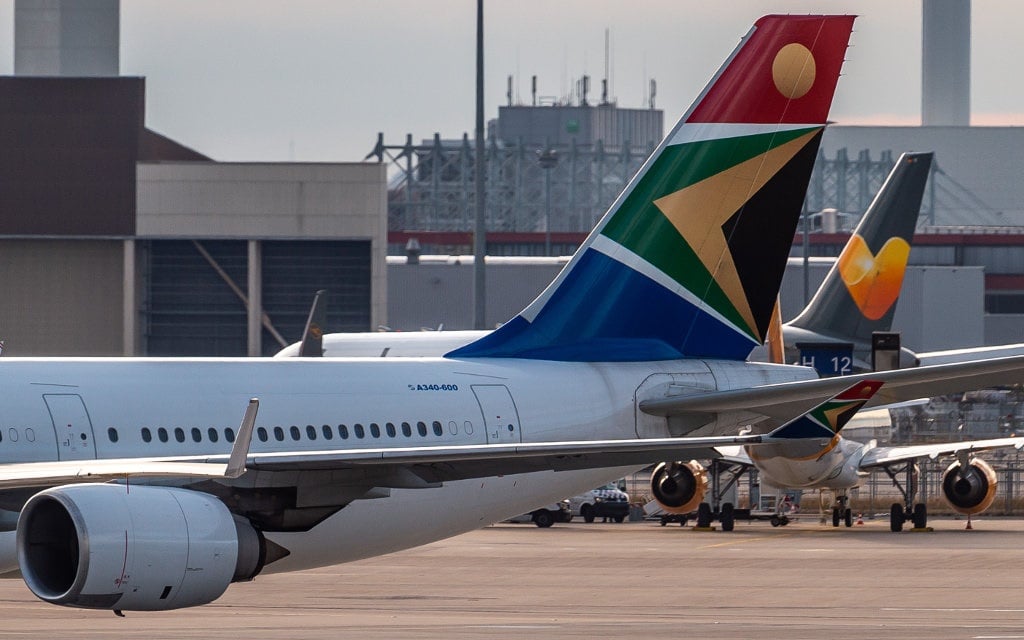
- An SAA flight meant to collect coronavirus vaccines in Brussels was prevented from taking off this week.
- The SA Civil Aviation Authority noted compliance issues relating to the correct certification of a non-SAA pilot training facility.
- The first batch of Johnson & Johnson Covid-19 vaccines arrived via a TUI airlines aircraft at OR Tambo International Airport late on Tuesday night.
A South African Airways (SAA) plane that was supposed to fetch vaccines for SA in Brussels, Belgium, was prevented from departing earlier this week due to not being compliant with civil aviation regulations at the time, according to Captain Grant Back, chairperson of the SAA Pilots Association (SAAPA).
Fin24 was told by a reliable source that the SAA aircraft is still parked on the tarmac and cannot be towed back as it is filled with fuel meant for its flight to Europe, which never took off.
The first batch of Johnson & Johnson Covid-19 vaccines arrived via a TUI airlines aircraft at OR Tambo International Airport late on Tuesday night.
"Apparently SACAA [the SA Civil Aviation Authority] picked up a host of issues, mostly about the training of the pilots to get them current. It does not relate to their competency, but is more about questions regarding the training facility outside of SAA which was used. This training facility apparently did not have the correct certification to allow it to do the training," says Back.
The Department of Public Enterprises (DPE), however, says permission to fly was merely received "later than anticipated".
The DPE responded late on Thursday afternoon to say that SAA would soon be undertaking "important national interest responsibilities" and the public would be kept informed about these special flights.
"By aviation law, all airline operators must apply to the SACAA to obtain an exemption to meet the minimum requirements for safe operations. SAA applied for an exemption in order to fly to Brussels to fetch the 80 000 Johnson & Johnson vaccines," it said.
"After careful consideration, SACAA requested more information to assess the application and subsequently approved the exemption. Therefore, media reports that the national carrier was prevented from flying to Brussels to fetch the vaccines are untrue, as permission to fly was obtained later than anticipated."
The DPE says that, as a shareholder on behalf of government, it appreciates and values the safety protocols that the flight and crew were subjected to by the SACAA.
The pilots who were going to be used for the "vaccine" flight were not SAAPA members and, therefore, not locked out.
Members of SAAPA have been locked out by SAA's business rescue practitioners since 18 December 2020, and negotiations to resolve the impasse are ongoing.
"SAA is now faced with a training problem. The company has already called training SAA pilots, asking if they would come back to do training. While SAAPA members remain locked out, it would be unlawful for them to tender their services," explains Back.
Furthermore, SAAPA intends to approach the CCMA regarding the non-payment of its members' 2019 13th cheque, which became due before SAA went into business rescue. The rest of the employees received theirs at the beginning of last year. Some of the pilots who resigned from SAAPA have in the meantime received this payment and three months' back pay.
SAA's rescue practitioners said on Thursday that SAA planes can be used for ad hoc cargo charters for which the company is then commercially remunerated. The first batch of Johnson & Johnson Covid-19 vaccines arrived at OR Tambo International Airport late on Tuesday night, delivered by TUI Airways.
Exemption request
The SACAA responded that it was approached by SAA with a request for an exemption relating to a flight to Brussels.
"The SACAA thoroughly considered the operator's request for the said exemption, and directed the operator to provide further details relating to some of the risk-mitigating measures," the organisation said in a statement on Thursday afternoon.
"The concern that the SACAA had with the initial exemption application was in relation to the recency of their flight deck crew, whereby the applicant did not provide adequate details on mitigation measures."
SACAA points out that recency is a vital safety requirement for pilots as outlined in the Civil Aviation Regulations.
"It must also be noted that SAA had voluntarily ceased operations a while back. However, this does not mean that they had surrendered their Air Operator Certificate (AOC) to the SACAA. In that regard, their AOC remains valid even though they had put their operations temporarily on hold," states SACAA.
"Any operator [that] is not conducting regular flights, or [its] aircraft are not in regular service or operation for one reason or another, is expected to conduct the required maintenance on the aircraft, which may include preservation and return to service maintenance."
According to SACAA, SAA managed to address the concerns that were raised and the exemption application was granted on 16 February.
An aviation expert, who wants to remain anonymous but whose identity is known by Fin24, said the vaccines that the SAA plane was supposed to collect probably weighed less than a ton.
"To send an Airbus 340-600 and pay crew would have cost lots more than paying a freight company to deliver it," said the expert.
The maximum cargo allowed for such a plane is 55.6 tons.
* This article was updated with comment by SACAA and the DPE. The Department of Health has been contacted and if any response is received, this article will be further updated.
